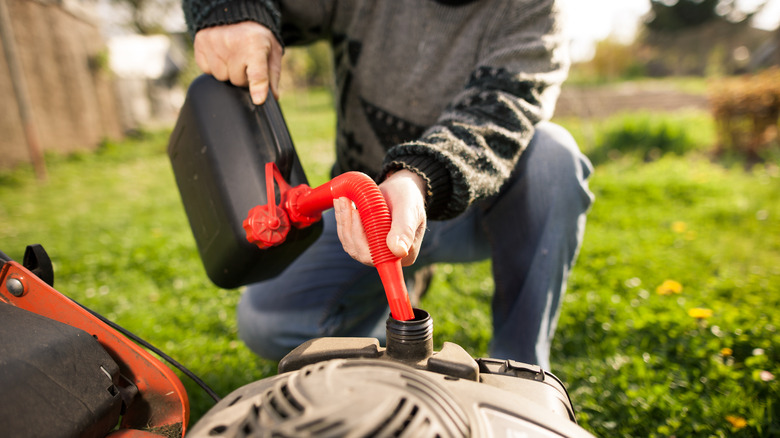Is Using Premium Gas In Your Lawn Mower Worth It? Here's What We Found
You want your lawn mower — one of your first and best grass cutting tools – to run at peak performance. But when it comes to powering up your gas lawn mower, does it pay to spring for more expensive premium gas? The evidence is in, and you're probably better off sticking with good old regular unleaded.
First, what is the difference between premium and regular gas? It's all about that octane rating on the pump. Regular gas runs about 87 octane, and premium usually sits between 91 and 94 octane. Octane basically tells you the pressure level where gas combusts and creates energy, which makes your lawn mower go. The higher the octane, the more pressure it needs to combust, which is ideal for heavy-duty engines. Your lawn mower, however, isn't likely to be a powerful, high-performance, high-compression engine, like the ones you might find in a Porsche 911.
While premium gas is more stable than regular gas, most lawn mowers and smaller engines simply aren't tuned to handle it, as they're made to run on lower, 87-octane gas. While premium gas isn't likely to damage the motor, you won't truly get more be benefit from paying 5% to 20% extra at the pump. Of course, always check your lawn mower manual, as a few mowers might benefit from higher octane gas. Also, keep in mind that you're unlikely to be able to go lower than 87 octane, unless you live at a high altitude — above 5,000 feet. There, you might use gas with 85 octane.
Other things to keep in mind when fueling up your lawn mower
When choosing the right kind of gas for your lawn mower, octane isn't the only consideration. Be careful when using blended ethanol gasoline, especially at rates above 10%. Ethanol attracts moisture, which can corrode your mower's engine.
The other thing to think about with fuel is that if it sits in your mower's gas tank too long unused, it can go stale. Old gas can gum up fuel filters and cause harm to engine valves. Fuel can begin to age at 30 days. So it's always a good idea to drain fuel tanks before you store your lawn mower for the winter. If you're still having trouble with your lawn mower, even after you've put in fresh gas at the right octane levels, check to see if you have any leaks in your fuel line. You can learn how to replace the fuel line on a riding lawn mower in a few steps.
Remember, too, that not all gas-powered lawn tools have the same requirements. While your lawn mower is likely to take just gasoline, your leaf blower might require an oil-gas mixture. If you have trouble starting a leaf blower after using unleaded fuel, check that you're using the right ratio of oil and gas. Picking the right type of fuel for all your gas-powered yard tools is important, so that you can keep them performing at their best for a long time.

